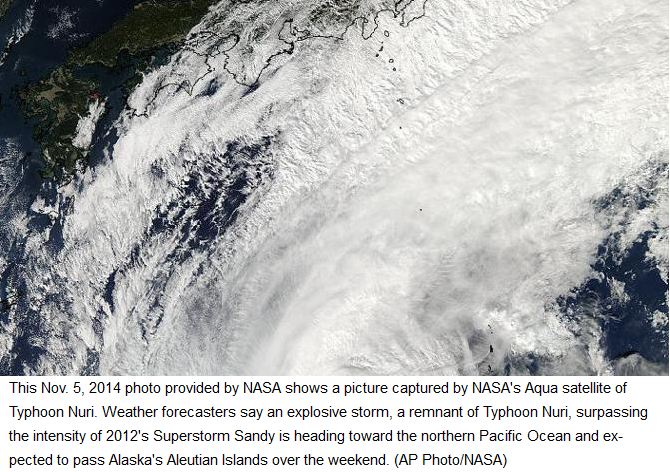
Associated Press
By BECKY BOHRER
Nov. 9, 2014
Alaska Storm Likely Becomes Strongest in Bering Sea History
http://abcnews.go.com/US/wireStory/alaska-storm-pushing-cold-air-lower-us-26786782
JUNEAU, Alaska (AP) A massive storm fueled by the remnants of Typhoon Nuri did not do much damage in Alaska's sparsely populated Aleutian Islands, but forecasters say it's anchoring a system that will push a frigid blast of air into the mainland United States and send temperatures plunging early this week.
Parts of the lower 48 states could see temperatures between 20 and 40 degrees below average, the National Weather Service said Sunday.
Snow was expected to move over the northern high plains and into the upper Great Lakes by Monday evening, with accumulations of close to a foot in parts of Minnesota and Wisconsin and up to 2 feet in the upper peninsula of Michigan, forecasters said.
The storm peaked Friday with sustained winds of 70 mph and gusts up to 96 mph on Alaska's Shemya Island. While it has weakened, it also is helping change the jet stream flow and anchoring a cold pattern that will send a surge of arctic air from the northern high Plains into the central Plains, said Bob Oravec, lead forecaster with the College Park, Maryland, weather service office.
On Alaska's Shemya Island, where 120 civilian contractors staff an early warning radar installation for the U.S. military, only minor facility damage was reported at Eareckson Air Station on the island 1,500 miles southwest Anchorage, Alaskan Command public affairs officer Tommie Baker said.
The corners of a roof were bent back and some dumpsters moved around, but no roof was torn off and the dumpsters didn't slam into any vehicles or buildings, Baker said. Workers locked themselves inside to wait out the storm.

Workers there are accustomed to extreme weather, including 100-mile winds. The community averages six weather-related lockdowns a year.
Baker said operations were back to normal Sunday morning, with planes able to come and go and people free to move outside of buildings. He said a crew conducting a damage assessment had not reported anything of concern.
The weather was cold, dreary and rainy with winds blowing like they typically do this time of year, Baker said.
While other parts of the country were expecting their first big winter storms, parts of south-central and southwest of Alaska could see windy, warmer and wet conditions, said Shaun Baines, a meteorologist for the weather service in Anchorage, Alaska. Temperatures along the Gulf of Alaska coastline were in the 40s.
Winter storm warnings were in effect Sunday for parts of Montana, North Dakota and South Dakota, with 4 to 5 inches of snow across the plains of Montana and up to 10 inches possible in the mountains.
Snow totals in areas could be hard to measure, though, because of the wind, said meteorologist Chris Zelzer, of the weather service's Great Falls, Montana, office.
"The big news for us will be the combination of really cold temperatures and really breezy conditions," he said.
Highs, which are typically in the low 40s for the Great Falls area this time of year, are forecast to dip to 7 degrees early this week and stay below freezing into the weekend. Sub-zero lows are also expected.
Further east, Delta Air Lines issued a winter weather waiver that allows travelers to avoid change fees if they rescheduled flights set for Monday to and from Minneapolis; Rochester, Minnesota; Sioux Falls, South Dakota; and Green Bay, Wisconsin. Rebooked trips must begin no later than Wednesday or a fare difference may apply.
"After last year's hard winter, people don't seem to be messing around this year," David Lansing, assistant manager at Frattallone's Ace Hardware in Burnsville, Minnesota, told the Minneapolis Star Tribune. "We're selling a few shovels here and there, but they're mostly going right for the snow blowers."